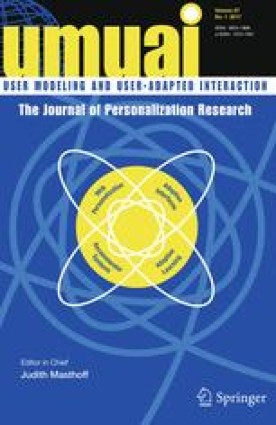- 充值
- 帮助

User Modeling and User-Adapted Interaction provides an interdisciplinary forum for the dissemination of novel and significant original research results about interactive computer systems that can adapt themselves to their users, and on the design, use, and evaluation of user models for adaptation. The journal publishes high-quality original papers from, e.g., the following areas: acquisition and formal representation of user models, including modeling of affect, personality, knowledge, expertise, interests, preferences, attitudes, goals, plans, culture, relationships and mental models conceptual models and user stereotypes for personalization student modeling and adaptive learning models of groups of users user model driven personalised information discovery and retrieval recommender systems adaptive user interfaces and agents adaptation for accessibility and inclusion generic user modeling systems and tools interoperability of user models personalization in areas such as affective computing ubiquitous and mobile computing language based interactions multi-modal interactions virtual and augmented reality social media and the Web human-robot interaction behaviour change interventions personalized applications in specific domains, such as: health, mobility, vehicular operation, news, workplace, consumer electronics, e-commerce and retail, cultural heritage, tourism, smart cities, games, cyber-security privacy, accountability, and security of information for personalization responsible adaptation: fairness, accountability, explainability, transparency and control methods for the design and evaluation of user models and adaptive systems In addition to papers from Computer Science, relevant papers from the fields of Psychology, Linguistics, Information Systems, Information Science, Education, Rehabilitation and Medicine are also considered if they have implications for the design of computer systems. The journal mainly publishes empirical research papers. Theoretical proposals should normally be appropriately substantiated, e.g., by empirical results, by an analytical discussion of the results of a computer implementation, or in very rare cases by a formal analysis. The central audience of the journal are researchers, students and industrial practitioners from the following areas: Adaptive Systems, Human-Computer Interaction, Artificial Intelligence, the Instructional Sciences, Information Systems, Linguistics, and the Information Sciences.
- 主办单位: SPRINGER
- 出版地区: Netherlands
- 出版周期: 双月刊
- 别名: 用户建模与用户交互
- 国际标准连续出版物号: ISSN 0924-1868
- 创刊时间: 1991年
-
vol.34 (2024)
vol.34 (2024)
05 04 03 02 01 -
vol.34 (2023)
vol.34 (2023)
-
vol.33 (2023)
vol.33 (2023)
-
vol.33 (2022)
vol.33 (2022)
-
vol.32 (2022)
vol.32 (2022)
-
vol.31 (2021)
vol.31 (2021)
-
vol.30 (2020)
vol.30 (2020)
-
vol.29 (2019)
vol.29 (2019)
-
vol.28 (2018)
vol.28 (2018)
-
vol.27 (2017)
vol.27 (2017)
-
vol.26 (2016)
vol.26 (2016)
-
vol.25 (2015)
vol.25 (2015)
-
vol.24 (2014)
vol.24 (2014)
-
vol.23 (2013)
vol.23 (2013)
-
vol.22 (2012)
vol.22 (2012)
-
vol.21 (2011)
vol.21 (2011)
-
vol.20 (2010)
vol.20 (2010)
-
vol.19 (2009)
vol.19 (2009)
-
vol.18 (2008)
vol.18 (2008)
-
vol.17 (2007)
vol.17 (2007)
-
vol.16 (2006)
vol.16 (2006)
-
vol.15 (2005)
vol.15 (2005)
-
vol.14 (2004)
vol.14 (2004)
-
vol.13 (2003)
vol.13 (2003)
-
vol.12 (2002)
vol.12 (2002)
-
vol.11 (2001)
vol.11 (2001)
-
vol.10 (2000)
vol.10 (2000)
-
vol.9 (1999)
vol.9 (1999)
-
vol.8 (1998)
vol.8 (1998)
-
vol.7 (1997)
vol.7 (1997)
-
vol.6 (1996)
vol.6 (1996)
-
vol.5 (1995)
vol.5 (1995)
-
vol.4 (1994)
vol.4 (1994)
-
vol.3 (1994)
vol.3 (1994)
-
vol.3 (1993)
vol.3 (1993)
-
vol.2 (1992)
vol.2 (1992)
-
vol.1 (1991)
vol.1 (1991)
- 1
- 2
- 3
- 4
不详

 分析评价
分析评价
